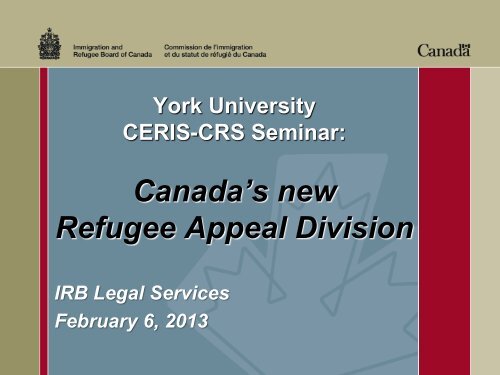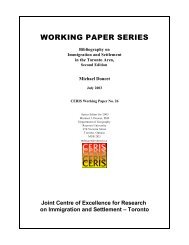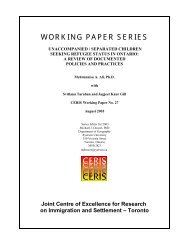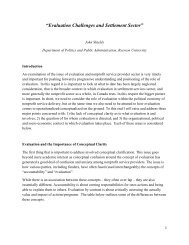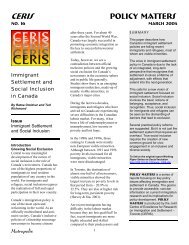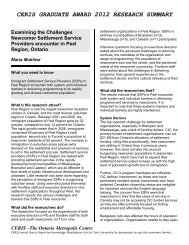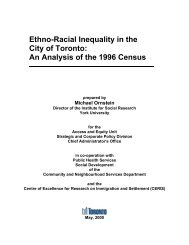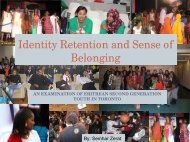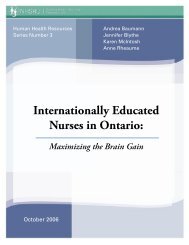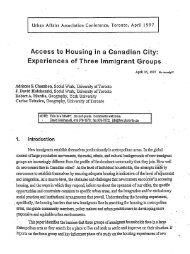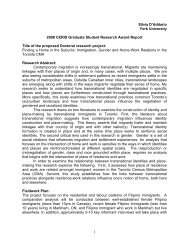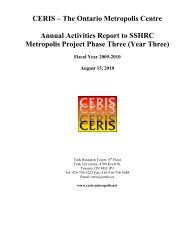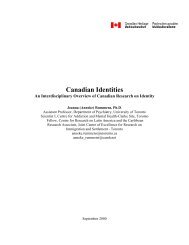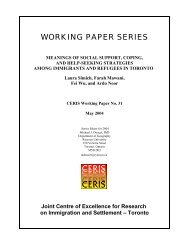Slides - CERIS
Slides - CERIS
Slides - CERIS
- No tags were found...
Create successful ePaper yourself
Turn your PDF publications into a flip-book with our unique Google optimized e-Paper software.
York University<strong>CERIS</strong>-CRS Seminar:Canada’s newRefugee Appeal DivisionIRB Legal ServicesFebruary 6, 2013
Objectives of the Session‣ Brief review of the steps in the new refugeedetermination system, in effect December 15, 2012‣ Focus on legislation governing the Refugee AppealDivision (RAD) of the Immigration and RefugeeBoard of Canada (IRB)•Slide 2
1. LegislationOverview of the Presentation2. IRB Composition and Functioning3. Refugee Claims and Refugee Protection Division(RPD) Proceedings4. Refugee Appeal Division (RAD) Proceedings5. What happens after the RAD Decision•Slide 3
Legislation•Slide 4
Legislative Hierarchy‣ Constitution of Canada, including theCanadian Charter of Rights and Freedoms‣ Immigration and Refugee Protection Act,made by Parliament‣ Immigration and Refugee Protection Regulations,made by the Governor in Council (GIC)‣ Refugee Appeal Division Rules,made by IRB Chairperson, with the approval of GIC•Slide 5
Act and Regulations‣ Immigration and Refugee Protection Act(IRPA) as amended by• Balanced Refugee Reform Act (BRRA), and• Protecting Canada’s Immigration System Act(PCISA)‣ Immigration and Refugee Protection Regulations(IRPR), as amended by SOR/2012-0252•Slide 6
IRB Rules‣ Oath or Solemn Affirmation of Office Rules(Immigration and Refugee Board), SOR/2012-0255(Oath Rules)‣ Refugee Protection Division Rules, SOR/2012-0256(RPD Rules)‣ Refugee Appeal Division Rules, SOR/2012-0257(RAD Rules)•Slide 7
IRBComposition and Functioning•Slide 8
‣ IRB consists of the:Structure of IRBIRPA, s. 151• Refugee Protection Division (RPD)(refugee protection determinations)• Refugee Appeal Division (RAD)(appeals from RPD decision allowing or rejecting a refugee claim)• Immigration Division (ID)(admissibility hearings; detention reviews)• Immigration Appeal Division (IAD)(removal order appeals; sponsorship appeals; loss of residencyappeals)•Slide 9
RPD and ID Members and Member ManagersIRPA, ss. 169.1, 172‣ RPD consists of the Deputy Chairperson (DC),Assistant Deputy Chairpersons (ADCs) and othermembers, including coordinating members (CMs) of theRPD, necessary to carry out its functions‣ ID consists of the DC, ADCs and other members of theID, necessary to carry out its functions‣ RPD and ID members are appointed in accordancewith the Public Service Employment Act•Slide 11
‣ Deputy Chairperson, IAD‣ Deputy Chairperson, RADGIC Members (cont’d)IRPA, ss. 153, 159- designated by GIC from among the full-time GIC members‣ Assistant Deputy Chairpersons, IAD‣ Assistant Deputy Chairpersons, RAD- designated by GIC from among the full-time GIC members‣ Coordinating Members, IAD‣ Coordinating Members, RAD- designated by Chairperson from among the full-time GICmembers•Slide 13
All IRB Members (Public Servant and GIC)IRPA, ss. 152.1, 154, 156‣ Oath or solemn affirmation of officeOath or Solemn Affirmation of Office (Immigrationand Refugee Board) Rules‣ Disposition after member ceases to hold office‣ Immunity from civil and criminal proceedings for actsdone in good faith‣ Cannot be called to testify in civil proceedings•Slide 14
Refugee ClaimsandRPD Proceedings•Slide 15
Key Steps in the Process‣ Eligibility Determination by CIC / CBSA‣ Referral of Claim to RPD by CIC / CBSA‣ RPD Hearing‣ RAD Appeal (unless prohibited under IRPA)‣ Judicial review by Federal Court==============‣ Minister’s Application to Cease or Vacate Refugee Protection at RPD‣ Humanitarian and Compassionate (H&C) Considerations by CIC (unlessprohibited under IRPA)‣ Pre-Removal Risk Assessment (PRRA) by CIC (12-month and 36-monthrestriction / PRRA function to be transferred to RPD in about 2 years)•Slide 16
Designated Countries of Origin (DCOs)IRPA, s. 109.1‣ CIC Minister may, by order, designate a country for thepurposes of:• prohibiting appeal to RADIRPA, s. 110(2)• different time limits for DCOs in regulationsIRPA, s. 111.1‣ High number of claims – quantitative criteriaIRPA, s. 109.1(2)(a)‣ Low number of claims – qualitative criteriaIRPA, s. 109.1(2)(b)•Slide 17
Effect of DCO designationIRPA, s. 109.1; IRPR, s. 159.9‣ Time limit for RPD hearing, if claimant is a national of acountry that is on DCO list on day claim is made:• 30 days – inland DCO claimant• 45 days – port of entry DCO claimantIRPR, s. 159.9(1)(a)Time limit is 60 days for all non-DCO claimantsIRPR, s. 159.9(1)(b)‣ No appeal to RAD, if claimant is a national of a countrythat is on DCO list on day RPD decision is madeIRPR, s. 110(2)(d.1)•Slide 18
DCO Designations – December 15, 2012IRPA, ss. 109.1(2)(a) and (b), and (3)‣ Order by CIC Minister establishing quantitativethreshold for the designation of countries of origin• 30 claims during any 12 consecutive months in thethree years preceding the date of designation• at least 75% (rejected; withdrawn; abandoned); or• at least 60% (withdrawn; abandoned)‣ Order by CIC Minister designating 27 DCOs:• 14 using the quantitative criteria• 13 using the qualitative criteria•Slide 19
“Designated Foreign National” (DFN)IRPA, s. 20.1‣ Minister may designate the arrival in Canada of a groupof persons as an “irregular arrival” IRPA, s. 20.1(1)‣ Foreign national who is part of the group becomes a“designated foreign national” IRPA, s. 20.1(2)‣ Minister cannot delegate that authority and must makethe designation personally IRPA, s. 6(3)‣ The designation, “by order” of the Minister, is publishedin the Canada Gazette IRPA, s. 20.1(3)•Slide 20
Effect of becoming a DFNIRPA, s. 20.1(1)‣ No appeal to RAD (IRPA, s. 110(2)(a))‣ Prohibition for 5 years on applications for permanentresidence, temporary resident permit, etc.‣ Mandatory detention of DFN age 16 or older on day ofarrival:• officer must detain on their entry to Canada• officer must arrest and detain if they become a DFNafter their arrival•Slide 21
DFN – Detention / ReleaseIRPA, ss. 56 to 58.1‣ Mandatory detention of DFN age 16 or older on day ofarrival continues until:• final determination allowing their refugee claim orPRRA application• released by Immigration Division under IRPA, s. 58,or• released by Minister (“exceptional circumstances”)under IRPA, s. 58.1‣ Detention reviews by Immigration Division –1 st review within 14 days; then on expiry of every 6 monthsIRPA, s. 57.1•Slide 22
DFN Designations – Made December 5, 2012IRPA, s. 20.1‣ Minister of Public Safety designated 5 groups of foreignnationals who illegally crossed the Canada-U.S. border inQuebec on• February 2 and April 26, 2012• October 11, 19, and 23, 2012‣ reasonable grounds to suspect as part of a humansmuggling operation, in contravention of IRPA, s. 117(1),for profit or in association with a criminal organization•Slide 23
Claims Inside CanadaIRPA, s. 99‣ A claim for refugee protection made inside Canada:• must be made to “an officer” at CIC / CBSA• may not be made by a person subject to a removalorder• is governed by IRPA, Part 2: Refugee Protection•Slide 24
Eligibility DeterminationIRPA, s. 100‣ Determination by an officer before referral to RPD‣ Burden of proving eligibility rests on claimant, who mustanswer truthfully all questions‣ “Deemed referral” after 3 working days, unlessconsideration of eligibility is suspended or claim isdetermined to be ineligible‣ RPD must notify Minister of possible ineligibility —RPD Rule 28•Slide 25
Grounds of IneligibilityIRPA, s. 101(1)‣ Refugee protection conferred‣ Prior claim rejected by the IRB‣ Prior claim ineligible, withdrawn, abandoned‣ Convention refugee status elsewhere‣ Claimant came via a “safe third country” listed inthe regulations (only land border crossing from USAis currently listed)•Slide 26
Grounds of Ineligibility (cont’d)IRPA, s. 101(1)(f), (2)‣ Claimant determined to be inadmissible on grounds of:• security - IRPA, s. 34• violating human or international rights - IRPA, s. 35 crimes against humanity and war crimes• serious criminality - IRPA, s. 36 conviction in Canada: offence punishable by a maximum term ofimprisonment of at least 10 years conviction outside Canada: equivalent to offence that, if committed inCanada, would be punishable by a maximum term of imprisonment ofat least 10 years• organized criminality - IRPA, s. 37•Slide 27
Referral to RPD – Duty of OfficerIRPA, s. 100(4.1); RPD Rule 3‣ Date of RPD hearing is fixed in accordance with theregulations, the IRB rules, and any directions of theChairperson IRPA, s. 100(4.1)‣ Officer must fix the date, time and location of the RPDhearing Rule 3(1)‣ Officer must give claimant• notices to appear for RPD hearing and for possibleabandonment hearing RPD Rule 3(4)(a)• blank BoC form, for Port of Entry claim Rule 3(4)(b)• RPD information package Rule 3(4)(c)•Slide 28
Date of RPD HearingIRPA, ss. 100(4.1), 111.1; IRPR, s. 159.9‣ Time limits set out in Regulations:30 days – inland DCO claimant45 days – port of entry DCO claimant60 days – all non-DCO claimants‣ Exceptions for:• fairness and natural justice• security screening• operational limitations of the RPD•Slide 29
Basis of Claim Form – Port of EntryIRPA, s. 100(4); IRPR, 159.8‣ Claimant must provide the RPD, within the time limits inthe regulations, with the information and documentsrequired by the RPD Rules and in accordance with thoseRules, i.e., the Basis of Claim Form (BoC)‣ Time limit for providing completed BoC Form to RPD:• not later than 15 days after referral of the claim‣ Extensions: RPD may extend time, for reasons of fairnessand natural justice•Slide 30
Basis of Claim Form – InlandIRPA, s. 99(3.1); IRPR, 159.8‣ Claimant must provide the officer, within the time limits inthe regulations, with the information and documentsrequired by the RPD Rules and in accordance with thoseRules, i.e., the BoC Form)‣ Time limit for providing BoC Form:• not later than the day on which the officer determineseligibility of referral of the claim•Slide 31
RPD HearingsIRPA, s. 170‣ In any proceeding before it, the RPD• may inquire into any matter relevant to the claimIRPA, s. 170(a)• must hold a hearing IRPA, s. 170(b)• but may accept a claim without a hearing(expedited process) IRPA, s. 170(f)• may question the witnesses, including the personwho is the subject of the proceedingIRPA, s. 170(d.1)•Slide 32
Decision on a ClaimIRPA, s. 107(1)‣ RPD:• shall accept a claim for refugee protection,• if it determines the claimant to be a “Conventionrefugee” or a “person in need of protection”, and• shall otherwise reject the claim•Slide 33
No Credible Basis / Manifestly Unfounded ClaimIRPA, ss. 107.1, 107(2)‣ No Credible Basis – RPD is of the opinion that there was no credible ortrustworthy evidence on which it could have made a favourable decision‣ Manifestly Unfounded Claim –RPD is of the opinion that the claim wasclearly fraudulent‣ Effect– no appeal to RAD IRPA, s. 110(2)(c)– no statutory stay of removal pending judicial reviewIRPA, s. 49(2)(c); Regulation 231•Slide 34
DecisionsIRPA, s. 169; RPD Rule 67‣ Decisions may be rendered orally or in writingIRPA, s. 169(c)‣ Written “Notice of Decision” for final decisionsmust be provided:• to the claimant or protected person• to the Minister Rule 67(1)•Slide 35
Reasons for DecisionIRPA, s. 169; RPD Rule 67‣ Reasons (oral or written) must be given for all finaldecisions IRPA, s. 169(b)‣ Written reasons must be given:• if the RPD rejects a claimIRPA, s. 169(d)• if requested by the person or the Minister within 10days IRPA, s. 169(e)• if required by the RPD Rules(see next slide: Rule 67(2))•Slide 36
Written ReasonsIRPA, s. 169; Rule 67(2)‣ RPD Rules require that written reasons must beprovided with the notice of decision• for a negative decision on a refugee claim, as perIRPA, s. 169(d)Rule 67(2)(a)• if Minister was not present when RPD rendered anoral decision and reasons allowing a claimRule 67(2)(b)• on all applications to vacate or cease refugeeprotectionRule 67(2)(c)•Slide 37
Decision Takes Effect – Single-Member PanelIRPA, s. 169(a); RPD Rule 68(1)‣ Final RPD decisions “take effect” in accordance with theRules‣ Take effect = loss of jurisdiction (functus officio)‣ Decision by single member takes effect:(a) if given orally at a hearing, when the member statesthe decision and gives the reasons; and(b) if made in writing, when the member signs anddates the reasons for the decision•Slide 38
Decision Takes Effect – Three-Member PanelIRPA, s. 169(a); RPD Rule 68(2)‣ Decision by three-member panel takes effect:(a) if given orally at a hearing, when all the membersstate their decision and give their reasons; and(b) if made in writing, when all the members sign anddate their reasons for the decision.•Slide 39
Refugee Appeal Division (RAD)Proceedings•Slide 40
Key RAD Time Limits – Filing and PerfectingIRPR, ss. 159.91(1), (2)‣ 15 days from receipt of written reasons for the RPDdecision to file the appeal‣ 30 days from receipt of written reasons for the RPDdecision to perfect the appeal‣ If the appeal cannot be filed and perfected within thosetime limits, the RAD may, for reasons of fairness andnatural justice, extend that time limit by the number ofworking days that is necessary in the circumstances41
Key RAD Time Limits – RAD DecisionIRPR, ss. 159.92(1), (2)‣ Time limit for the RAD to make a decision on an appealis 90 days after the day on which the appeal isperfected, except when a hearing is held‣ If it is not possible for the RAD to make a decision onan appeal within 90 days,• the decision must be made as soon as feasible afterthat time limit42
Jurisdiction of the RADIRPA, ss. 162, 163‣ Determine questions of law and fact, includingquestions of jurisdictionIRPA, s. 162(1)‣ Must proceed informally and quickly as thecircumstances and the considerations of fairness andnatural justice permitIRPA, s. 162(2)‣ Quorum: single member; Chairperson may constitute athree-member panelIRPA, s. 163•Slide 43
Physical Presence /Live TelecommunicationIRPA, s. 164‣ At the discretion of the RAD, a RAD hearing may beconducted:• in the physical presence of the subject, or• by means of live telecommunication with thesubject (such as videoconference)•Slide 44
Powers of the RADIRPA, s. 165‣ Powers of a Commissioner under Part 1 of the Inquiries Act:• summoning witnesses• administering oaths• May do any other thing necessary for a full and properhearing‣ Also see:• RAD Rule 52 (where no applicable rule)• RAD Rule 53 (RAD’s own initiative, etc.)•Slide 45
Hearings “in the Absence of the Public”IRPA, s. 166‣ RAD proceedings are normally held “in the absence ofthe public”(previous English terminology: “in camera” or “in private”)IRPA, s. 166(c)‣ On application or on its own initiative, the RAD may• conduct a proceeding in public, or• take any other measure that it considers necessary toensure the appropriate access to the proceedingsIRPA, s. 166(b), (d)•Slide 46
UNHCR as ObserverIRPA, ss. 166(e), (f)‣ Representative of the United Nations HighCommissioner for Refugees:• is always entitled to observe proceedingsconcerning a protected person or a refugee claimant• but is never allowed to observe the secret part ofIRPA, s. 86, proceedings (non-disclosure of nationalsecurity information, etc., at ID and IAD only)•Slide 47
Right to CounselIRPA, ss. 167(1) and 91‣ IRPA, s. 167(1): a person who is the subject of IRBproceedings and the Minister may, at their own expense,be represented by legal or other counsel‣ IRPA, s. 91: subject to this section, no person shallknowingly, directly or indirectly, represent or advise aperson for consideration or offer to do so inconnection with a proceeding or application under IRPA•Slide 48
“Paid Representatives”IRPA, s. 91(2), (5)‣ Persons who may advise or represent for considerationare members in good standing of:• law society of a province• Chambre des notaires du Québec, or• Immigration Consultants of Canada RegulatoryCouncil (ICCRC)‣ exemption for student-at-law (articling student) actingunder the supervision of a member in good standing of aprovincial bar or the Chambre des notaires du Québec•Slide 49
Family, Friends, NGOs:Representation for No Fee‣ Family, friends, and non-governmental organizations(NGOs) and others who do not charge fees or receiveother consideration for providing immigration and refugeeadvice• can continue to represent persons before the IRBwithout being members of ICCRC, a law society or theChambre des notaires du Québec•Slide 50
Appeal to the RAD – GroundsIRPA, s. 110(1)‣ Person or the Minister may appeal to RAD on a• question of law• question of fact, or• question of mixed law and fact52
No Appeal to the RADIRPA, s. 110(2)‣ No appeal to the RAD in respect of an RPD decisionregarding:• designated foreign national (DFN) (IRPA, s. 20.1)• withdrawn or abandoned claim• no credible basis or manifestly unfounded claim• exception to the Safe Third Country Agreement• designated country of origin (DCO) (IRPA, s. 109.1)53
No Appeal to the RAD (cont’d)IRPA, s. 110(2)‣ No appeal to the RAD in respect of an RPD decisionregarding:• Minister’s application that refugee protection has ceased(whether allowed or rejected)• Minister’s application to vacate refugee protection(whether allowed or rejected)• claim described in Transitional Provisions(BRRA, ss. 36(1) and 37)54
No Appeal to the RAD (cont’d)IRPA, s. 110(2)‣ No appeal to the RAD in respect of an RPD decisionregarding:• deemed rejection of claim because of Extradition Act(IRPA, s. 105(4))• application for protection, i.e., Pre-Removal RiskAssessment (PRRA) (IRPA, s. 112(1))55
RAD ProceedingsIRPA, s. 110(3)‣ RAD must proceed without a hearing,• on the basis of the record of the RPD proceedings,• except that the RAD may, in accordance with certainprovisions of IRPA,– accept documentary evidence and writtensubmissions, and– conduct an oral hearing56
RAD Proceedings – New Evidence – PersonIRPA, ss. 110(3), (4), (5)‣ RAD may accept documentary evidence and writtensubmissions from the person who is the subject of the appeal• the person may present only evidence– that arose after the rejection of their claim, or– that was not reasonably available, or– that the person could not reasonably have beenexpected in the circumstances to have presented, at thetime of the rejection• however, that restriction does not apply in respect ofevidence presented in response to evidence presented bythe Minister57
RAD Proceedings – New Evidence – MinisterIRPA, ss. 110(3), 171(a.5)‣ RAD may accept documentary evidence and writtensubmissions from the Minister• the Minister may, at any time before the RADmakes a decision, submit documentary evidenceand make written submissions in support of theMinister’s appeal or intervention in the appeal(IRPA, s. 171(a.5))58
Oral HearingIRPA, s. 110(6)‣ RAD may hold a hearing if, in its opinion, there isdocumentary evidence referred to in subsection 110(3)(i.e., “new evidence”)(a) that raises a serious issue with respect to thecredibility of the person who is the subject of theappeal;(b) that is central to the decision with respect to therefugee protection claim; and(c) that, if accepted, would justify allowing orrejecting the refugee protection claim.59
Composition of PanelIRPA, s. 163‣ Matters before a Division shall be conducted before asingle member unless the Chairperson is of the opinionthat a panel of three members should be constituted‣ For three-member panels:• possible participation of UNHCR and other interestedpersons (interveners) (IRPA, s. 110(3))• decisions are precedential (IRPA, s. 171(c))60
RAD DecisionsIRPA, s. 111(1)‣ After considering the appeal, the RAD shall make oneof the following decisions:(a)(b)(c)confirm the determination of the RPD;set aside the determination and substitute adetermination that, in its opinion, should havebeen made; orrefer the matter to the RPD for redetermination,giving the directions to the RPDthat it considers appropriate.61
RAD Decisions (cont’d)IRPA, s. 111(2)‣ RAD may make the referral to the RPD under IRPA,s. 111(1)(c), only if it is of the opinion that(a) the decision of the RPD is wrong in law, in factor in mixed law and fact; and(b) it cannot make a decision without hearingevidence that was presented to the RPD.62
Structure of the RAD RulesPart 1Part 2Part 3Rules applicable to appeals madeby the person who is the subject of the appealRules applicable to appeals madeby the MinisterRules applicable to all appealsPart 4Rules applicable to oral hearings63
Part 1: Appeals Made by the PersonRAD Rules 2 – 7‣ Rule 2(1) – to file the appeal, the person must provide theRAD with three copies of a written Notice of Appeal‣ Rule 2(2) – RAD gives a copy to Minister‣ Rule 2(3) – content of Notice of Appeal:• contact information (appellant; counsel; designatedrepresentative)• language of appeal (English / French)• CIC identification number / RPD file number‣ Rule 2(4): time limit to file set out in IRPR, s. 159.91(15 days from receipt of written reasons for RPD decision)64
Part 1: Appeals Made by the PersonRAD Rules 2 – 7‣ Rule 3(1) – to perfect the appeal, the person must providethe RAD with two copies of the Appellant’s Record‣ Rule 3(2) – RAD gives copy to Minister‣ Rule 3(3) – content of Appellant’s Record:• RPD notice of decision and written reasons• all or part of transcript relied on• any documents refused by RPD• any documentary evidence relied on• law, case law or other legal authority65
Part 1: Appeals Made by the PersonRAD Rules 2 – 7‣ Rule 3(3) – content of Appellant’s Record (cont’d):• written statement indicating• whether appellant is relying on new evidence(IRPA, s. 110(4))• whether appellant is requesting an oral hearing(IRPA, s. 110(6)) and if they are making anapplication for change of location (Rule 66)• language and dialect to be interpreted at a hearing,if necessary66
Part 1: Appeals Made by the PersonRAD Rules 2 – 7‣ Rule 3(3) – content of Appellant’s Record (cont’d):• Memorandum with detailed submissions regarding• errors that are grounds of the appeal• where the errors are located in the RPD reasons,transcript, or audio recording• how evidence is “new” and relates to the appellant• the decision the appellant wants the RAD to make• why RAD should hold a hearing67
Part 1: Appeals Made by the PersonRAD Rules 2 – 7‣ Minister may intervene at any time before the RAD makesa decision (IRPA, s. 171(a.4))‣ Rule 4(1) – Intervention by the MinisterMinister intervenes by filing:• written Notice of Intervention together with anydocumentary evidence that the Minister wants to relyon (mandatory)‣ Rule 4(3) – Intervention Record(optional because of IRPA, ss. 171(a.5))68
Part 2: Appeals Made by the MinisterRAD Rules 8 – 13Rule 8 – Filing the appeal by the Minister• Rule 8(1): to file the appeal, the Minister must provide,first to the person, a written Notice of Appeal, and thento the RAD, two copies of the written notice of appeal• Rule 8(2): content of notice of appeal• Rule 8(3): proof it was provided to the person• Rule 8(4): time limit set out in IRPR, s. 159.91 (15 daysfrom the receipt of written reasons for RPD decision)69
Part 2: Appeals Made by the MinisterRAD Rules 8 – 13Rule 9 – Perfecting the appeal by the Minister• Rule 9(1): to perfect the appeal, the Minister mustprovide “any supporting documents”, first to the personand then to the RAD• Rule 9(2): content of appellant’s record (optional)• Rule 9(3): length of memorandum• Rule 9(4): proof documents were provided to the person• Rule 9(5): time limit set out in IRPR, s. 159.91 (30 daysfrom the receipt of written reasons for RPD decision) 70
Part 2: Appeals Made by the MinisterRAD Rules 8 – 13Rule 10 – To respond, the person files:• written Notice of Intent to Respond together with theRespondent’s Record• no later than 15 days after:• the day the respondent receives “any supportingdocuments” from the Minister, or• if an extension of time to perfect was allowed, theday on which the respondent is notified of theextensionRule 11 – Reply by the Minister (Optional and at any time)71
Part 3: Rules Applicable to All AppealsRAD Rules 14 – 54Covers many topics such as:• Communication with the Division• Counsel• Language of the Appeal• Designated Representative• Specialized Knowledge• Notice of Constitutional Question• Documents• How to make an Application• Joining or Separating Appeals• Proceedings conducted in public, etc.72
RPD RecordRAD Rule 21‣ RAD must provide notice of appeal to RPD after appealperfected‣ RPD must, no later than 10 days after, provide RPD recordto the RAD containing• notice of decision and written reasons• Basis of Claim Form (BOC)• all documentary evidence• written representations, if any• audio or other electronic recording of the hearing‣ RAD must provide RPD record to Minister if Minister did notparticipate at RPD73
Designated RepresentativeIRPA, s. 167(2), RAD Rule 23‣ Required for• Minors (under 18 years of age)• Incompetent persons (person who is unable toappreciate the nature of the proceedings)– Factors Rule 23(6)• whether can understanding of reasons ofproceeding• statements and behaviour in proceeding• expert evidence• whether DR in another division than RPD74
Designated RepresentativeRAD Rule 23 (Cont’d)‣ If DR appointed at RPD, continues at the RADRule 23(1)‣ If no DR appointed at RPD, counsel must notifyRAD in writing of need for a DR (except whereminor’s claim joined with parent’s claim) Rule 23(2)‣ Exceptions:• if DR for minor at RPD and no longer minor at theRAD Rule 23(8)• if designation terminated by RAD because nolonger required or suitable Rule 23(9)75
Constitutional Question / Charter ChallengeRAD Rule 25‣ Party must provide notice of constitutional question thatincludes – Federal Courts Rules, R. 69• party’s name and RAD file number• legislative provision being challenged• material facts relied on and a summary of legal argument‣ Notice must be served on Attorney General of Canada andof each province, Minister (even if not yet intervened),UNHCR (if provided notice of intention to providesubmissions), any interested person, Division76
Part 3: Rules Applicable to All AppealsRAD Rule 43‣ Assignment of Three-Member Panel• ordered by Chairperson (IRPA, s. 163)• parties notified, as well as UNHCR, and the Ministereven if the Minister has not yet intervened in theappeal• UNHCR is provided with RPD proceedings and RADappeal documents and submissions• UNHCR may provide notice of intention to providewritten submissions77
Part 3: Rules Applicable to All AppealsRAD Rule 46‣ Application by an “interested person” (intervener) toparticipate in an appeal conducted by a three-memberpanel includes:• explanation of why the applicant wants to participate• submissions, and explanation of how they are relevant• explanation of how their submissions differ from thoseof person and Minister and how it will help RAD decidethe appeal78
Part 4: Rules Applicable to RAD HearingsRAD Rules 55 – 68Covers many topics such as:• fixing a date• notice to appear• conduct of a hearing• appellant in custody• interpreters• observers• additional documents• witnesses• application to change location of hearing• application to change date and time of hearing• abandonment 79
Part 4: Rules Applicable to RAD HearingsRAD Rules 55 – 68‣ Rule 57 – Conduct of a Hearing• restricted to issues provided in notice to appear,unless RAD orders otherwise• unless the RAD orders otherwise, the standard orderof questioning will be: (1) by appellant; (2) by anyother party; (3) by appellant in reply; and (4) by RAD• limiting questioning of witnesses• oral representations, unless RAD orders otherwise• limits on representations80
What happens afterthe RAD decision•Slide 81
Application for Judicial ReviewIRPA, ss. 72, 169(f)‣ Application is made to the Federal Court‣ “Leave” (i.e., permission) must be granted for an oralhearing in Court‣ Application must be filed within 15 days from the• giving of notice of an RAD decision, or• the sending of written RAD reasons•Slide 82
Application for Judicial ReviewIRPA, ss. 72, 169(f)‣ Appeal to the Federal Court of Appeal possible only if:• in rendering judgment, the Federal Court certifiesthat a “serious question of general importance” isinvolved and states the questionIRPA, s. 74(d)‣ Further appeal to Supreme Court of Canada, only withleave of the FCA or SCCSupreme Court Act, ss. 37.1, 40(1)•Slide 83
ReopeningIRPA, s. 171.1; RAD Rule 49‣ At any time before Federal Court has made a finaldetermination in respect of an appeal that has beendecided or declared abandoned, appellant may make anapplication to the RAD to reopen the appeal‣ RAD does not have jurisdiction to reopen on any ground— including a failure to observe a principle of naturaljustice — an appeal in respect of which the Federal Courthas made a final determination‣ Rule 37 applies, and Minister is always considered to be aparty•Slide 84


